Your donation will support the student journalists of Francis Howell Central High School. Your contribution will allow us to purchase equipment and cover our annual website hosting costs. FHCToday.com and our subsequent publications are dedicated to the students by the students. We hope you consider donating to allow us to continue our mission of a connected and well-informed student body.
Exploring Identities
Diving into the LGBTQ+ experience allows people to better understand it
May 27, 2021
Waving Their Banners
The realities of coming out as an adolescent
One December night, only a few years ago, a 12-year-old boy sat at a kitchen counter, writing a letter to his mother about why he needed to quit Boy Scouts immediately because he just couldn’t wait until summer. As he neared the end, the boy added something slightly out of place at the bottom of his letter; he wrote that he was gay.
Junior AJ Vargas (He/Him) thought nothing of the letter and sealed it up before placing it on his mother’s nightstand. He didn’t know what would happen when she read it, but at that moment, he felt like he would be okay.
Coming out is one chapter in the life of an LGBTQ+ member. It is a simple phrase on a banner that makes an announcement to the world saying, “This is who I am.” Everyone’s story is different, and everyone’s story deserves to be told.
For Vargas, his story began when he realized he was attracted to boys in third grade. He had no clue what it meant, just that he was more intrigued by boys than by girls. It wasn’t until he was ten years old and learned what being gay meant that he realized he was a part of the LGBTQ+ community.
“After I learned what being gay was and that there was a whole community of people who shared this experience I started to realize that I was different from the other boys in my class,” Vargas described.
At the time, Vargas went to a private Catholic school where he dealt with a lot of misconceptions about the LGBTQ+ community on the basis of religion.
“I had the Church telling me all these things about people like me that I knew for a fact was incorrect,” Vargas explained. “For example, I remember my religion teacher once told my class that being born gay was like being born with Down’s Syndrome. While that still greatly upsets me to this day because it’s overtly disgusting and incorrect, it never made me question my self-worth or dignity as a gay person.”
Another student, senior Emily Zuehlke (She/Her) also dealt with a lot of misconceptions when she came out, only unlike Vargas, she deals with misconceptions from the majority of people. Zuehlke identifies as asexual, meaning she feels no sexual attraction to any gender whatsoever. Zuehlke remembers the moment she realized she was asexual.
“My whole life I just never was sexually attracted to anybody and I just thought, ‘Oh, once I hit puberty,’ [but it] never came,” Zuehlke described. “And then I just remember one day I was scrolling through Instagram and I came across an LGBTQ+ account and they posted art of this person with an asexual flag, and I was trying to educate myself on what the flags were and I searched [the flag] and it just like automatically clicked with me. I knew right away, ‘Oh, yeah, that’s what I am.’”
Once she figured out who she was, Zuehlke struggled with when she should come out due to the general public’s lack of knowledge regarding asexuality.
“I was very scared that people were going to be like, ‘Oh, that’s not a thing,’ or they were not going to understand it,” Zuehlke explained. “Once I came out, [I] had to constantly explain what it meant to every single person I met. And [when] I came out to my mom and I told her multiple times what it is, she still didn’t fully understand it. Then I came out to my dad and he laughed in my face and was like, ‘That’s not a thing.’”
Likewise, Vargas also struggled with coming out to other people, especially his father, due to predetermined perceptions of the LGBTQ+ community.
“I didn’t come out to [my dad] until I was 15 because unfortunately I had to mentally prepare myself for the idea that he might disown me because he’s pretty religious,” Vargas said. “Thankfully that didn’t happen, but 15-year-olds shouldn’t have to worry if their parents will stop loving them.”
However, Vargas has said that even though coming out may be difficult, it has made his life so much easier.
“While my religion teacher was awful, she did say something true about [LGBTQ+] people that I think about a lot, which is that their crosses that they carry (meaning the load that gay people have to deal with throughout their lives) are extremely heavy,” Vargas stated. “Some days I feel so absolutely crushed by all of the heteronormative expectations pressed upon me by my family and society that I’d rather just lie on the floor than keep going.”
“But let me tell you, the first time I came out, it felt like for once in my life, my burdens got lighter. This pressure that had been building on me for years had finally eased up a little. It felt glorious. And while my load has gotten heavier over the years, it has become easier and easier to carry with each coming out. I live for the day that I can finally stretch my back, relax, and not feel pressured by anybody to live a certain way.”
Out and About
How transgender teens accept and embrace their identity
Like any student after a long lecture, senior Seth Wilcox (He/Him) headed to the bathroom before his next period. Except unlike other kids, Wilcox experienced threats, physical assault, and verbal abuse all from restroom visits. Wilcox is a transgender male within our student body. Out of fear, he chooses not to use the restroom at school anymore, not because he wants to but because he will not put his safety in jeopardy.
“It is not a good situation to be in, so I avoid anyone that could possibly cause me harm in any way, shape, or form,” Wilcox said.
A student should not have to live in fear everyday by simply trying to use the restroom, according to Wilcox. It is petrifying to have to think about being physically beaten, assaulted, or threatened just when doing the most mundane activities.
As society evolves, we see more and more transgender individuals comfortable with expressing their true identity. Unfortunately, seeing full acceptance for trans youth is a controversial issue in society.
Whether it’s transphobia from others, internalized transphobia, or simply the ignorance of not understanding this group of people, they continue to face adversity in becoming the real them.
Freshman Jay Shore (He/Him) expressed that his self- confidence went on the decline after sharing with others around him that he is transgender.
“Some people in my life were not very accepting,” Jay said. “They would try to keep me from others or insult me, and it really affected my self-esteem.”
Transgender youth face these situations on the daily. Whether it be people mocking them, comments in the hall, or glares from people in the supermarket, Seth and Jay always feel they are being judged in some way by someone.
“There is a group of kids that make it a point when I leave school to call me the local tranny,” Wilcox said. “I have no idea who they are, but they make it a point.”
Similarly, Jay shares his specific experiences dealing with transphobia and being his true self.
“The most difficult thing about being transgender is all the trouble I get from others,” Jay said. “When my friends parents found out I was transgender, they said they could not talk to me, or even associate with me.”
According to the National Center for Transgender Equality, 75 percent of transgender students feel unsafe in their school environment. Transgender students feeling unsafe additionally results in lower GPA and higher absence rates.
As a school, teachers, faculty, and administrators should do everything in their power to make transgender youth feel more comfortable being who they are in a very public setting.
Seth shared his experience of having a teacher create a stellar environment for him to be himself.
“My Spanish teacher always refers to me with male spanish terms like chico or señior,” Wilcox said. “I love her to death, she is my favorite teacher.”
Spanish teacher Jennifer Mertz says she supported Wilcox from day one in his transition.
“Supporting Seth through his transition was a no-brainer for me,” Mrs. Mertz said. “I didn’t know Seth before his transition but when his parents reached out to me and told me that the name on my roster wasn’t the name he chose to be called, it was an easy switch.”
Additionally, Mrs. Mertz said she knows how hard it is for students to be themselves and that is why she supports anyone for who they are.
“I’ve struggled with my identity being a part of the LGBTQ+ community myself, and it takes a lot of bravery to tell someone who you are,” Mrs. Mertz said. “Our trans students should not be punished for taking that step and it takes no effort to make sure someone who is trans feels normal.”
She emphasized how crucial it is, to her personally, to make even the smallest changes to support a student.
“Seth is a wonderful student with incredible intelligence,” Mrs. Mertz said. “I believe in accepting people for who they are, if making small changes in my vocabulary is how I can do that, I will.”
Mrs. Mertz also added transgender individuals should continue to be supported because they aren’t any different from what others define as normal people.
“It’s easy for us to use a different name when someone gets married, and this is no different.” Mrs. Mertz said. “They are not a different person when they transition, they are just a different gender.”
Mrs. Mertz says the most important part to supporting trans people is to remember they are like everyone else.
“Transgender people are people, and they deserve to be treated as such,” Mrs. Mertz said. “It’s my job as a teacher to respect all students in my classroom, and making sure trans students have someone who won’t misgender them or deadname them is a part of that.”
Additionally, Jay says he has had a huge supporter in his life through his sister, Sophie Shore.
“She has been one of my biggest supporters throughout my entire life and as soon as I came out she was as supportive as she could be,” Jay said. “She used my correct pronouns and called me by my right name. She is basically my shelter from the storm.”
Sophie shares that she has felt being there for her brother has been crucial in supporting who he is.
“I am obviously supportive of him because he is my closest sibling,” Sophie said. “I would support him no matter what he feels he needs to be.”
Sophie added the crucial nature to being an ally because she knows the struggle transgender people are going through.
“They are going through a tough time and are trying to figure out who they are,” Sophie said. “It’s so important for them to know that they will always have someone to be there and support them.”
Recently, President Joe Biden also voiced his support for transgender Americans in his presidential speech to congress on April 28th, 2021, saying they are brave people and he has their back. Seth expressed how much he agrees with the statement the president made.
“What he says is true. People who are transgender are brave and very resilient when it comes to all the factors they must deal with,” Wilcox said.
Commiting to their transition and who they are is the most rewarding part for transgender students, realizing they are becoming the true versions of themselves. Usually, transgender youth feel trapped in the gender they were assigned with at birth.
“When I was a kid I never really fit into a specific box,” Wilcox said. “Once I hit middle school, when puberty set in, I was shoved in the female gender box and knew that didn’t match who I was.”
Knowing he did not feel he was his true self with his birth assigned gender, Wilcox took to researching if there was a term for how he felt.
“I looked up on the internet and was like ‘Oh there is this word for transgender, that makes a lot of sense’,” Wilcox said. “I have identified with that for about five years now.”
Jay also agrees with Wilcox in that the smallest first step in identifying who they are is very rewarding.
“A couple years ago I tried to force myself to think I was in the right body,” Jay said. “When I started shopping in the men’s section, that was when I began to feel a lot more comfortable with myself and who I am.”
The continuation of support for our trans youth is crucial to their self-confidence. Many trans kids feel their most rewarding thing about transitioning is committing to becoming their true selves and seeing their peer support.
“Being out has really helped me be myself and unapologetic about it,” Wilcox said. “Being around friends who are like ‘Seth you’re amazing’ I’m like ‘Yeah!’ or my boyfriend who’s like ‘You’re the best person ever and an amazing boyfriend,’ is incredible.”
Similarly, Jay shares how his self- confidence has shot up since transitioning, and how he has changed as a person.
“Transitioning has made me more confident in myself,” Jay said. “Everyone I am close to has supported me and I have become more outgoing, more happy, and more open to other people.”
The most crucial thing to understand about the transgender community is that they are normal people according to Wilcox. They are just like everyone else.
“We are all different. It is not all these teenage white born female people who are trans, it is people of color, its people who are assigned male at birth, it’s all different kinds of people,” Wilcox said.
Within These Walls
The discussion regarding acceptance of LGBTQ+ students and staff
The LGBTQ+ community at FHC, both students and staff, can sometimes be overshadowed by other issues present in the school. Although the community is respected, they aren’t represented as much as they’d like to be and feel they should be.
French teacher Amy Roznos (She/Her), who has been at FHC for five years, believes the school is inclusive, but could do better.
“I think it would help to have a day school-wide where we celebrated LGBTQ+ visibility day,” Roznos said. “Or if we talked about how to approach conversations about LGBTQ+ issues.”
Starting conversations about LGBTQ+ topics can be difficult and awkward, especially with older generations. Roznos expanded on the issue of starting conversations revolving around the LGBTQ+ community.
“I think that talking about these kinds of things makes some people uncomfortable and so they avoid these kinds of important conversations,” Mrs. Roznos said. “That being said, I think that that may describe my generation more than the students’ generation. I have seen more students talk about issues like LGBTQ+ with much more ease and comfort than some people my age or older.”
One form of representation shown at FHC is the GSA, or Gay Straight Alliance, founded by Barb Riti (She/Her) in 2017 to make members of the LGBTQ+ community feel safe and seen at FHC.
“The GSA functions differently depending on the students who are involved in the club,” Riti said. “Typically at the start of the year, we make decisions as to what our purpose we will serve. In recent years, the group has chosen our purpose to be supported so our activities are centered around that. We had Halloween and Christmas parties, craft making, game playing, etc.”
Junior Audrey Beahan (She/Her), who was a member of the GSA her freshman and sophomore year, spoke up about the club and its purpose.
“The GSA has always been a safe, judgement-free place to discuss our experiences with our identities,” Beahan said. “It’s a place to reach out and find people similar to you if you need that outlet, but no one is forcing you to stay, and
I think that in and of itself makes it feel safer overall, too.”
The GSA’s sole purpose is to make members of the LGBTQ+ body at FHC feel included and supported. Roznos touched on the supportive environment at FHC and how students and staff treat her.
“I definitely feel supported at FHC,” Roznos said. “When I got married this year, most people offered their congratulations. I didn’t hear anything negative from anyone.”
Beahan agreed that the school is inclusive and supportive of its LGBTQ+ community. “I have plenty of peers and teachers that I know I am comfortable with talking about this topic without judgement,” Beahan said. “We’re far from perfect, especially among students, but overall it’s a pretty supportive place.”
Mrs. Riti explained that although the majority of people at FHC are supportive, there are always bound to be bad apples.
“I have [seen discrimination], but it typically comes from a place of ignorance and immaturity,” Mrs. Riti said. “Those moments can become opportunities to educate.”
However, Mrs. Riti also expressed that she believes the LGBTQ+ community is treated justly and there aren’t many problems.
“I do believe LGBTQ+ students are treated fairly at FHC based on conversations during our GSA meetings and my personal experiences,” Riti said.
“Does this mean there are never issues… no… it just means that when there is an issue, that it is handled in a way that is fair.”
With the LGBTQ+ community comes stereotypes and stigmas, whether it’s at school, work, or even just out in public. These stereotypes come from the way people dress, talk, and act. Beahan shares her opinion on assuming people’s sexualities based on society’s stereotypes and stigmas.
“…A lot of kids tend to speculate on the sexuality of their teachers, which is really weird to me,” Beahan said. “I have only ever had one teacher who is openly a part of the LGBTQ+ community, but before they told us about it, a lot of my classmates were speculating about whether they were or not, and something about that just really rubs me the wrong way.”
Beahan then voiced the purpose of being an ally and the process of coming out when you’re ready.
“Part of being accepting of the LGBTQ+ community is letting people come out and talk about it on their own terms, not your own,” Beahan said. “It’s really weird to try to decipher what your teacher’s (or one of your peers’) sexuality is based solely on the clothes they wear and the way they act. A person’s sexuality has nothing to do with their character or who they are as a person, so why does it matter?”
While the FHC entity is pretty supportive of most, there are things they can be exclusive about. Mrs. Roznos shared her thoughts on how people are treated at school based on what they identify themselves as.
“Unfortunately, I think that many are more accepting of the LGB and less accepting of the T (trans),” Roznos said. “Like I said earlier, honest, open conversations could lead to a lot more understanding about this topic. Maybe FHC should make those kinds of conversations happen. I would like to see that.”
As a whole, the FHC body is reasonably supportive and inclusive of the LGBTQ+ community that lies in its walls. While there are a few instances here and there and points of advances for more equality and respect, most LGBTQ+ identifying students and staff members feel safe and seen at FHC. Nevertheless, there is always room for improvement.
Coming to Terms with Coming Out
One family shares their story of acceptance
Since as early as third grade, senior Krystal Arias (She/Her) has known she wasn’t exactly like the rest of her peers. Despite this, she never struggled to be social. She identified with her female friends; they would talk about boys they had crushes on and celebrities they adored. There was always a part of Krystal she didn’t see in her friends, however: the part that liked girls. Though Krystal didn’t always have the knowledge to completely understand this piece in the puzzle that completed her, she now recognizes it as bisexuality, or the attraction to two or more genders.
Krystal’s journey has taken up over half of her life, but she didn’t share it with her parents, Lourdes (She/Her) and Henry Arias (He/Him), until two-and-a-half years ago.
Still recalling the exact date she came out to her parents, Krystal describes her recollection of the events with precision, detailing the rollercoaster of emotions she went through while revealing an integral part of her identity.
“I told my parents Nov. 19, 2017,” Krystal said. “I wasn’t nervous to tell them because I knew they would love me no matter what, and that they’d eventually come around… but in the moment I was an emotional wreck.”
Upon learning about her daughter’s sexuality, Mrs. Arias was taken aback. After years of hearing Krystal talk to her about boys, discovering Krystal liked girls came as a surprise.
“The coming out for me… was shocking at first. I think… I was shocked in the beginning because… we’d be watching shows or be out in the street and she’s like ‘Oh my god that guy’s so hot’ and then all of a sudden she’s like ‘Well I like girls,’” Mrs. Arias said. “At the beginning I was like ‘Wait what’s going on?’ but now I think we better understand… there’s so many more identities nowadays that I was unfamiliar with so I’ve had to learn a little bit more about it.”
While Krystal’s mother never suspected her daughter was anything but straight, Mr. Arias always had an inkling that Krystal was attracted to her own gender.
“Once she told me, I was like “Oh, you know… I kind of knew it.‘ For my wife it was pretty shocking,” Mr. Arias said. “It’s my daughter, and I love her no matter what. It was something new for us, but… we learned how to deal with it.”
Mrs. Arias shares the same unconditional love her husband has for Krystal, and she never let a once confusing label change that.
“I’m a pretty open-minded person and I have always taught my kids to… love everyone,” Mrs. Arias said.
Though her love for Krystal never wavered, Mrs. Arias did have worries about the hardships Krystal may experience due to her sexuality.
“[As a parent] you worry about all the stories that you hear in the news, like bullying or people that are [going to] dislike her, what’s the family [going to] think? You go through all those things in your mind, and obviously it wasn’t that we didn’t accept her or love her… it was what the outside world is [going to] think, what was she going to go through?” Mrs. Arias said.
Despite the concerns Mrs. Arias had, she wanted to do only one thing: support her daughter.
“I think that we just have been supportive to her like we have been accepting of what she is and… the decision she made,” Mrs. Arias said. “We try to make her partner feel as welcome and loved as we can… We try to tell her all the time that we love her no matter what, and I’m just happy that she can be herself. For me it was always I wanted my kids to be happy, however they are.”
Because of how Krystal’s parents reacted to her sexuality, she has been able to be her true and authentic self around them.
“I’m the happiest I’ve ever been honestly,” Krystal said. “And a huge chunk of that is because of them.”
Though Krystal’s parents never had any trouble accepting her for who she is, Mr. Arias has some advice for parents who may be more apprehensive about their children’s identities.
“At the end of the day, that’s your son or your daughter. You’ve got to accept them as they are… You always want to see them happy,” Mr. Arias said. “I know for some people it might be hard, but they’ve got to work on it… because otherwise, you’re [going to] have a miserable kid.”
Mrs. Arias agrees; regardless of a parents personal beliefs, the most important thing they can do is support their child.
“Every parent wants the best for their kid and they want them to be happy. If you don’tsupportthem,they’re[goingto]goto somebody else that might not give them the right advice. I know you might think that it’s [going to] be hard, but… [when you] accept them, they’re happy, they trust you.”

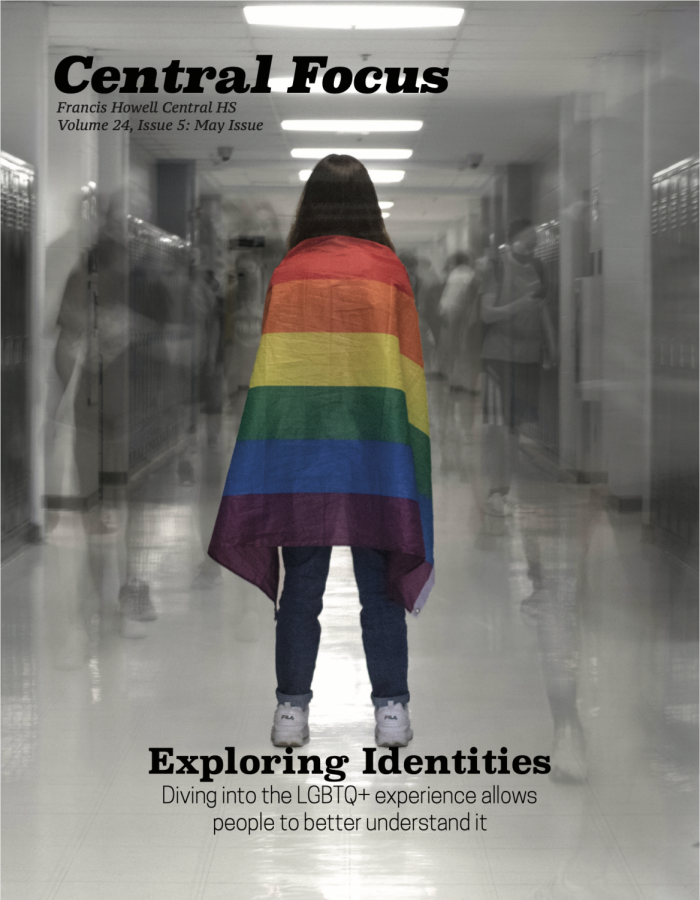
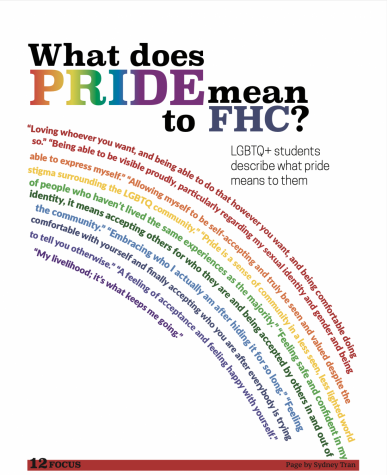
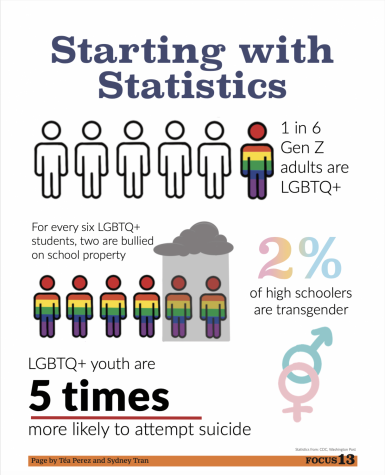
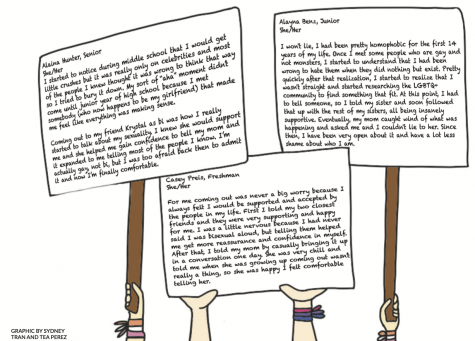
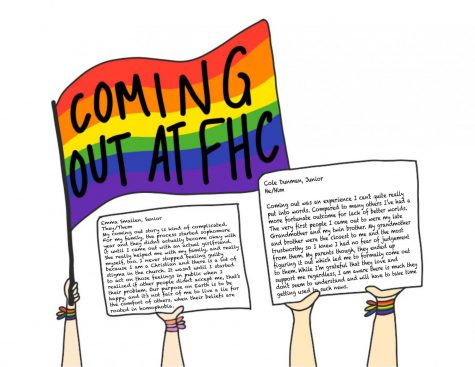

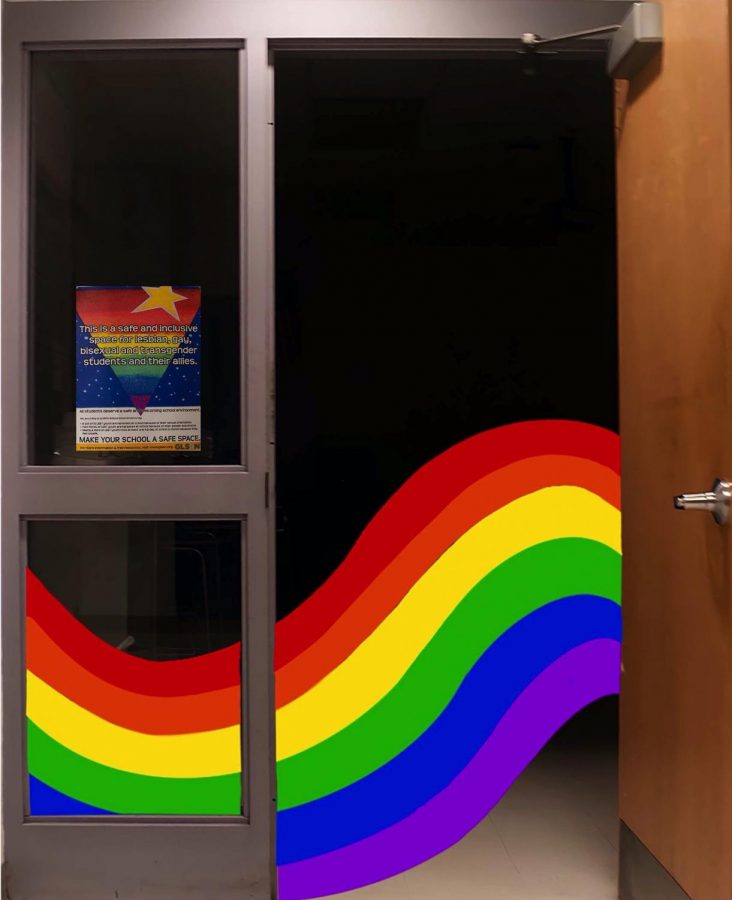
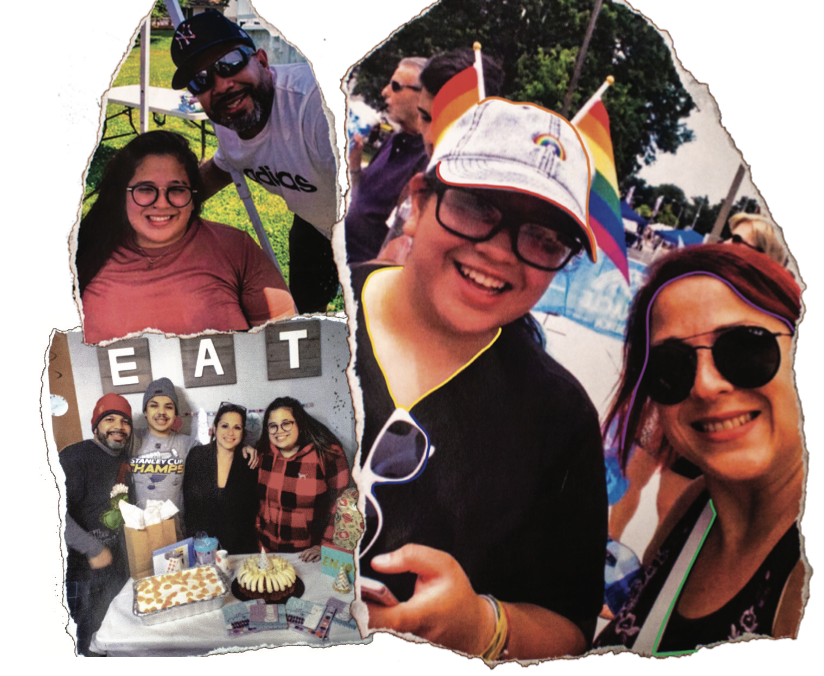
Steve Lilley • Sep 13, 2021 at 12:11 pm
Faith Beckman managed to write an article that both bashed Catholics and endorsed validating an eight-year-old’s life-changing choices about sexual identity. That’s a lot to accomplish in one short article. Perhaps a future article on diversity could explore Catholic beliefs.
I’m confident most teachers love and respect all students regardless of their state of mind.
It is at least refreshing to see that Francis Howell’s staff and administration, who also embrace critical race theory, advocate overturning the moral values accepted for millennia by all major religions